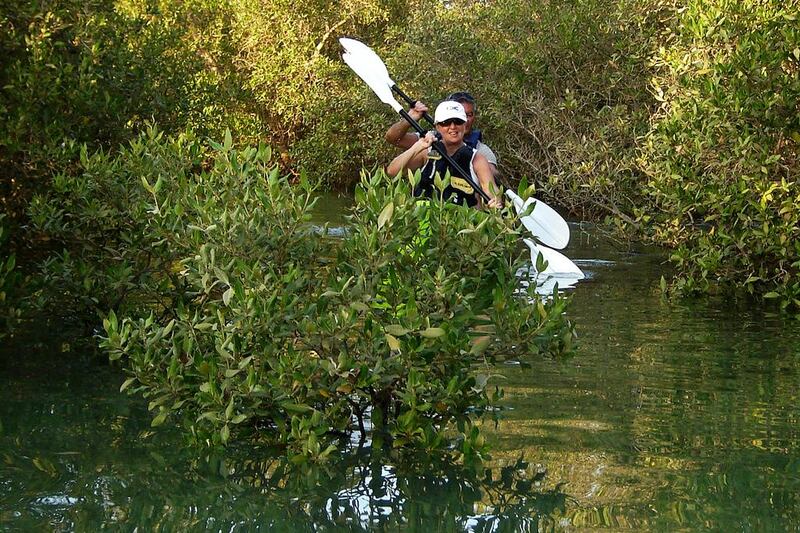Last week, we had a little party and a friend brought over a huge bowl of banana cream pudding from Magnolia Bakery to share with the guests. I’m lukewarm about Magnolia’s famous cupcakes, but that pudding was the best thing I’ve tasted in years. We dived into that big bowl with our individual spoons, not bothering with plates, racing to make sure we each got enough banana cream goodness.
Last week, I also went kayaking in the mangroves at sunset. It was, in its own way, as wonderful as eating my way through that bowl of pudding. The kayaks launch from a point just off Sheikh Zayed Street, but within a few minutes of paddling, the hum of rush-hour traffic was replaced with the sound of water splashing against the boat and the cries of birds gathering at twilight. It was as if I’d floated into another world, very far from the city.
We paddled out into the middle of the bay, past the immense bulk of the Anantara Hotel and the houses that have recently been built along the shore. From a distance we watched a swirl of pink flamingos descend on a sandbar and up close, fish and crabs skittered along just under our boats. The full moon rose on one side of the bay while the sun set on the other: our kayaks seemed like the fulcrum in the world’s balancing act.
The guide told us that without the intervention of Sheikh Zayed bin Sultan Al Nahyan, the mangroves would have died out. The Sheikh, who was “green” long before it was fashionable, insisted that Abu Dhabi’s natural resources be preserved. The mangroves play an essential role in Abu Dhabi’s ecosystem. They filter pollutants, including carbon dioxide, prevent coastal erosion and shelter aquatic species.
Mangroves grow fairly quickly, as our guide pointed out. He showed us a group of trees, already a metre or so tall, that had been planted fairly recently. These new trees serve as anchors on a recently built man-made island. Eventually, a new building will sprout on this island, although the guide wasn’t sure who was building what, or when.
We avoided the new island, which has blocked some of the existing channels, and headed deep into the mangrove swamp instead. I thought about how wonderful it is to live in a place where I can find “nature” so easily. In Manhattan, the only easy access to nature is Central Park. Anything else requires a great deal more work.
As I paddled, I started daydreaming about future weekend outings, perhaps with a picnic and a camera. My plans were dashed, however, when the guide showed us the barren banks of a channel. The mangroves along this channel had died because the wake of speeding jet-skis erodes the soil and the mangrove root systems. “Jet skis are illegal here,” said the guide, “but …” Suddenly I had a new vision: a weekend warrior on a jet ski colliding with my kayak. At best I’d be capsized; I didn’t want to think about the “worst”.
I realised then that I wasn’t paddling through a unique natural resource. I was adrift in a good example of the tragedy of the commons. This phrase describes what happens when individual self-interest trumps the interest of a group by depleting a commonly shared resource. What’s one joyride through the mangroves, we ask ourselves; what’s one more house on a man-made island; what’s one more plastic bottle falling into the bay?
Abu Dhabi law mandates that anyone who digs up mangroves must plant twice the area they remove, but some scientists question whether new-growth mangroves have the same positive effect as established trees. If mangroves are planted too close together, for instance, the mudflats that are key components of mangrove forests cannot develop. It’s like someone breaking your heirloom china platter. You can buy a new one but it won’t be the same.
Here’s the thing: had we run out of banana cream pudding the other night, we could go and buy more. But where do we go if we run out of mangroves?
Deborah Lindsay Williams is a professor of literature at NYU Abu Dhabi. She is the author of The Time Locket, a novel that she wrote as Deborah Quinn





